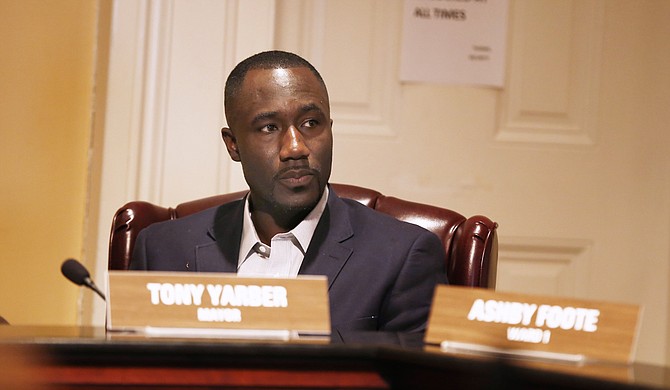Earlier today, Mayor Tony Yarber issued a statement to the citizens of Jackson. The message came in the form of a letter—an appeal, really—and is a rebuke of the council's April 21 vote against his proposal to declare an emergency in response to the city's infrastructure problems. Photo by Imani Khayyam.
The City of Jackson is moving ahead with plans for massive infrastructure upgrades despite the city council's snub of Mayor Tony Yarber's request for a civil-emergency proclamation earlier this week.
This morning, the city posted a number of bid announcements for heavy machinery, including tractors, backhoes, dump trucks and trailers. The city also posted an advertisement for a project manager for Jackson's $400 million federal consent decree, which requires the City to make a number of improvements to its sewers and wastewater treatment plants.
Earlier today, Yarber issued a statement to the citizens of Jackson. The message came in the form of a letter—an appeal, really—and is a rebuke of the council's April 21 vote against his proposal to declare an emergency in response to the city's infrastructure problems.
Yarber's message implies that the city council's vote represents opposition to his administration's "progressive, aggressive measures to remedy years of infrastructure neglect."
"I stand with you," Yarber said, referring to citizens. "I stand committed to doing the things that help produce the Jackson that we all seek."
Only one council member, Ward 3's Kenneth Stokes, backed the mayor's play because he believed it would help patch potholes, which are a menace to cars and are anathema to Jackson politicians running for reelection. Charles Tillman abstained but seemed to be aligned with the rest of the opposition. Ward 7 Councilwoman Margaret Barrett Simon did not attend.
Their uneasiness stemmed from the fact that the council is unsure about what specific legal authority the mayor has to declare a municipal emergency and, if he does, what that authority entails. Even if what Yarber's administration says is true—that the declaration will put the city in line for funding from external agencies and expedite public-works crews turning dirt in the city—council members aren't sure what the fiscal and legal implications will be.
"In the climate of our state, if we relax procurement laws, that puts us in trouble," said Ward 6 Councilman Tyrone Hendrix of his reticence to approve the proclamation.
Furthering confusion was Yarber's insistence that emergency work would continue no matter how the council voted. At the same time, the mayor quibbled with the inference that the proclamation is little more than a symbolic gesture. In fact, Yarber argued, having the council's imprimatur on his declaration would help the city get into rooms with state and federal influence-makers with whom the city might not otherwise have an audience.
In defense of his initial emergency declaration, Yarber said his administration "changed the paradigm" and started a national conversation on what constitutes an emergency.
"We're going to go to work either way," the mayor said before the vote.
Most immediately, that work will include repairing a water-line fissure at the Chastain water tank, which officials said is in "imminent danger" and, if it fails, could leave thousands of people without water.
Funding options include a $2.5 million loan from the Mississippi State Department of Health that the city might not have to pay back if it meets certain requirements. Then, there's the roughly $12 million from the 1-percent sales tax that remains unspent as the 10-member sales-tax commission mulls the comprehensive infrastructure master plan that Jackson developed.
Similar to the national conversation about dipping into strategic petroleum reserves when the price of gas spikes, Stokes also suggested the city consider using some of its fund balance—a percentage of the city's revenues that state law and city ordinance requires the city to keep in an emergency reserve fund.
The council and mayor seemed open to exploring that idea, but took no votes on Stokes' suggestion. After the meeting, Yarber told reporters that his administration might still issue emergency declarations on a per-project basis, but that the council's "no" vote would not affect the city's ability to respond to crises.



Comments
Use the comment form below to begin a discussion about this content.